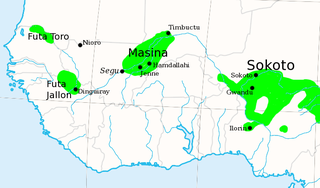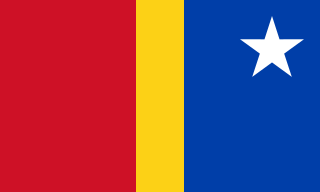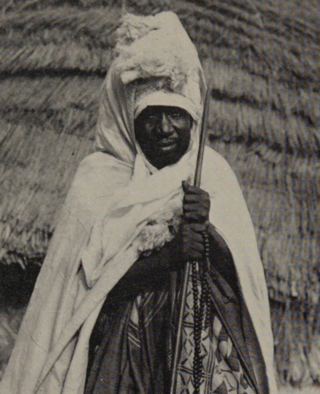Related Research Articles

The Fulajihads sometimes called the Fulani revolution were a series of jihads that occurred across West Africa during the 18th and 19th centuries, led largely by the Muslim Fula people. The jihads and the jihad states came to an end with European colonization.

Ibrahim Dabo was the leader of the Fulani Sullubawa in Kano and founder of the eponymous Dabo dynasty. His progeny has lasted over two centuries reigning as Muslim rulers of the ancient city-state of Kano. The dynasty has become synonymous with the ancient city-state in affectionate sayings as "Kano ta Dabo Cigari". They have independently ruled the Kano Emirate from 1819 until the Battle of Kano in 1903 which as a result of British colonisation transformed into the Kano Emirate Council.

Muhammadu Inuwa was Emir of Kano, he replaced Emir Muhammadu Sanusi who abdicated in 1963. Emir Muhammadu Inuwa was replaced by Emir Ado Bayero his nephew and son-in-law.
Muhammad Dan Yaji, known as Muhammad Alwali II was the last sultan of the Sultanate of Kano. His reign coincided with a period of upheavals in Sudanic History that saw a series of religious Jihads waged by the Fula People. In 1807, after a protracted struggle with Fula clans, Muhammad Alwali was ambushed and assassinated at Burum-Burum in modern Kano. His death marked the end of the Kutumbawa line of Hausa aristocrats in Kano and the fall of the 800 year old Bagauda Dynasty.
Muhammad Tukur was Emir of Kano from 1893 until his death in 1894. Tukur presided over Kano during the Bassasa, a period of civil war that saw multiple claimants to the Kanoan throne.

Aliyu Ibn Abdullahi-Maje Karofi was an Emir of Kano, a state in what is now Northern Nigeria. Also known as Babba and Mai Sango- The Gun User. Emerging at the end of the Basasa, his reign was marked by a series of costly wars and fortification projects that heavily militarised the erstwhile commercial Emirate. His escapades as Emir of Kano were recorded in the official historical canon of the Kano Emirate, the Tarikh Al Kano. The ballad of Ali Zaki, commemorates his reign as the last Emir of Kano.

The Dambazawa are a Fulani clan residing mainly in Kano State, Nigeria. They were among the key promoters, planners and executors of the Fulani Jihad in Kano, which took place between 1804 and 1807 under the leadership of Shehu Usuman dan Fodiyo. The clan was said to be the top financier of the jihad because it was said to be extremely wealthy at the time of the jihad. Other Fulani Clans that participated in the Jihad included: the Jobawa, the Yolawa, the Sullubawa, the Danejawa and others, as well as a contingent of the native Hausa people led by Malam Usuman bahaushe. Together they formed a formidable force and toppled the 158 year Kutumbawa dynasty led by its last ruler Muhammad Alwali dan Yaji dan Dadi bakutumbe who ruled between 1781 and 1806.
Muhammad Dan Abdullahi, known as Muhammad Kisoki, was the Sultan of Kano from 1509 until his death in 1565. His 56-year reign is the longest of the state's Rumfawa era.
Abdullahi Dan Kanajeji, known as Abdullahi Burja, was the sixteenth ruler of Kano. Through forging of powerful alliances and the creation of trade routes, Burja shifted the identity of the Kano Sultanate towards trade and commerce, what Kano and its people are known for today. He was the first Hausa King to pay tribute to Bornu which secured an agreement to open trade routes from Gwanja to Bornu. He was also the first King to own camels in Hausaland. By the end of the 15th Century, Kano emerged as one of the most vibrant trading centers in the Sahel. Through trade, the Hausa language and culture was spread throughout the region.
Barandamasu Tsamiya Dan Shekarau, known as Tsamiya, was the King of Kano from 1307 until his death at the hand of his half brother Usman Zamnagawa in 1343.
Kabe Dan Kumbari, known as Alhaji Kabe, was the thirty-ninth ruler of the Sultanate of Kano, reigning for the ten-year period between 1743 and 1753. He was primarily remembered by the Kano Chronicle as a malevolent and ruthless King. It is said that no record can be kept of the number of battles and wars he fought or those fought by the subkingdoms of Kano by his orders, most notably against Gobir. The baleful nature of his reign led to the ousting of the already unpopular bloodline of Muhammad Sharefa.
Yakubu was a Sultan of Kano who reigned from 1463 to 1499.
Yakufu was a Sultan of Kano who reigned in 1565.
Dadi was a Sultan of Kano who reigned from 1670 to 1703.
Muhammad Sharefa was a Sultan of Kano who reigned from 1703 to 1731.
Kumbari was a Sultan of Kano who reigned from 1731 to 1743.
Sulaimanu was an Emir of Kano who reigned from 1807 to 1819.
Osumanu was an Emir of Kano who reigned from 1846 to 1855.

Abdullahi was Emir of Kano from 1855 until his death in 1883.
Muhammad Bello was an Emir of Kano who reigned from 1883 to 1892.
References
- 1 2 Palmer, H. R (1908). Journal of the Royal Anthropological Institute of Great Britain and Ireland. 1908.
{{cite journal}}: Missing or empty|title=(help)